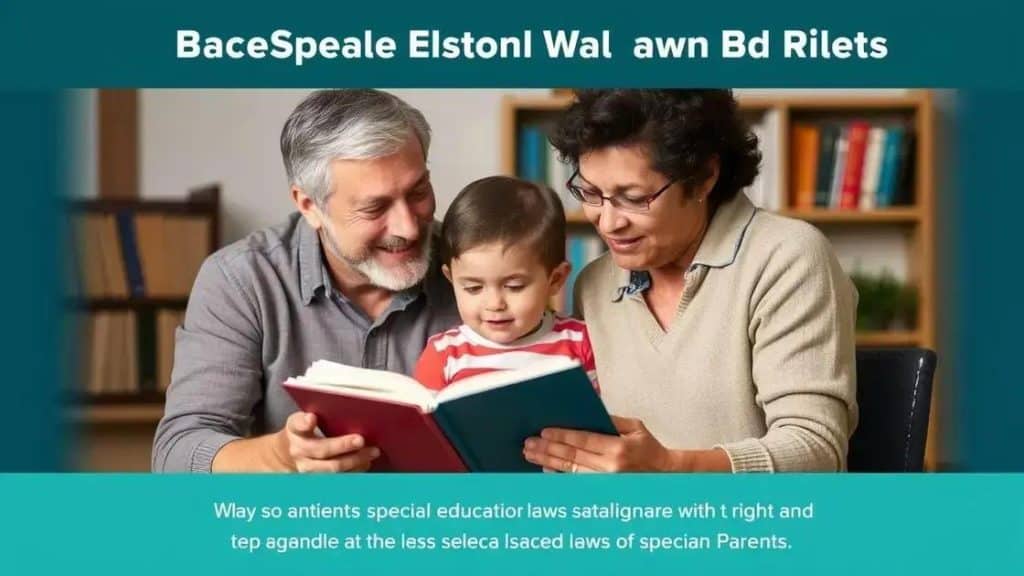Collection special education law: a guide for parents

Special education law ensures that students with disabilities receive appropriate educational services, advocating for their rights through processes like the Individualized Education Program (IEP).
Collection special education law can feel overwhelming for many parents. With the right information, you can better understand the rights and resources available to you and your child.
Understanding special education law basics
Understanding special education law is crucial for parents and guardians. It ensures that children with disabilities receive the necessary support to thrive in educational settings. Many families may wonder where to start when navigating these laws and what their rights truly are.
Key Principles of Special Education Law
Special education laws are designed to protect the rights of students with disabilities. These laws ensure that every child can access a free and appropriate public education (FAPE). Additionally, they emphasize the importance of individualized education programs (IEPs) tailored to each child’s unique needs.
Important Terminology
To better understand these laws, familiarize yourself with essential terms:
- FAPE: Free Appropriate Public Education, which means students with disabilities must have access to education without charge.
- IEP: Individualized Education Program, a customized plan outlining specific educational goals and services for a child.
- Inclusion: The practice of integrating students with disabilities into general education classrooms.
Another crucial aspect is the Individual with Disabilities Education Act (IDEA), which governs how states and public agencies provide early intervention, special education, and related services. Under IDEA, parents have the right to participate in the decision-making process regarding their child’s education.
Rights of Parents and Students
Parents have significant rights under special education laws. They have the right to:
- Request evaluations to determine their child’s eligibility for special education services.
- Participate in meetings regarding their child’s IEP.
- Access their child’s educational records.
Understanding special education law can help parents advocate effectively for their children. Knowing their rights and the available resources ensures that they can support their child’s educational journey effectively. Each child deserves the opportunity to succeed, and being informed is the first step in creating a positive educational environment.
Rights of parents and children
The rights of parents and children under special education law are vital for ensuring that students with disabilities receive the education they deserve. It’s important for families to understand these rights, as they play a critical role in advocating for their children.
Key Rights for Parents
Parents have several essential rights when it comes to special education. They can:
- Request an evaluation: Parents can ask for their child to be evaluated to determine eligibility for special education services.
- Participate in meetings: Parents are invited to attend meetings regarding their child’s Individualized Education Program (IEP) and contribute to decisions about their education.
- Access educational records: Parents have the right to view their child’s records and understand the data being collected about their educational progress.
These rights empower parents to act as advocates for their children, ensuring that their educational needs are met effectively.
Rights for Children
Children with disabilities also possess numerous rights that protect them. They are entitled to:
- Free Appropriate Public Education (FAPE): Every child has the right to receive a quality education without charge.
- Individualized Education Plans (IEP): Children should have a customized plan that suits their specific learning needs.
- Least Restrictive Environment (LRE): Children should be educated alongside their non-disabled peers whenever possible.
These rights guarantee that children are given the chance to learn and grow in an environment that supports their unique requirements.
Understanding these rights is the first step for parents to ensure their children receive the best possible educational experience. With knowledge, they can confidently advocate for appropriate services and support.
Navigating the Individualized Education Program (IEP)

Navigating the Individualized Education Program (IEP) can seem overwhelming, but understanding its components makes the process much easier. An IEP is a written document that outlines specific educational goals and services for a child with a disability. It is essential for addressing the unique needs of each student.
Components of the IEP
The IEP contains several important parts. These include:
- Present Levels of Performance: This section details how the child is performing in school, including academic, social, and emotional areas.
- Measurable Goals: The IEP must include specific, measurable goals that the child should achieve within a certain timeframe.
- Special Services: This section outlines any special services the child will receive, such as speech therapy, counseling, or accommodations in the classroom.
Each part of the IEP plays a crucial role in ensuring that the child receives the support they need to succeed. Parents and educators should work together to develop these components, ensuring they align with the child’s needs.
The IEP Meeting
IEP meetings are a vital part of the process. During these meetings, parents, teachers, and specialists review the IEP and make necessary updates. Here are a few important tips for parents to remember before attending:
- Be Prepared: Bring any relevant documents, such as evaluations or reports.
- Ask Questions: Don’t hesitate to seek clarification on any point that is unclear.
- Be Collaborative: Approach the meeting with an open mind, ready to discuss your child’s needs.
During the meeting, it is crucial to advocate for the child’s best interests. Being informed and involved can significantly affect the development of the IEP.
Understanding how to navigate the IEP process empowers parents and guardians to make informed decisions for their children. It builds a partnership with educators dedicated to helping students achieve their full potential.
Resources for parents supporting special education
Parents supporting children in special education often seek resources to help them navigate the system effectively. Numerous organizations and tools are available to provide assistance, guidance, and information.
Online Resources
The internet offers a wealth of information for parents. Websites like the National Center for Learning Disabilities and Understood provide valuable insights into special education laws and best practices. Here are key resources to explore:
- National Parent Technical Assistance Center: This resource helps parents understand their rights and access services.
- Parent Advocacy Coalition for Educational Rights (PACER): PACER offers information and support for parents of children with disabilities.
- Wrightslaw: A well-regarded site that provides reliable information about special education law, educational rights, and advocacy.
These websites can help parents stay informed and empowered in their advocacy efforts.
Community Support
Connecting with local organizations can also be beneficial. Many communities have support groups and workshops for parents. These groups often provide opportunities to share experiences, advice, and strategies. Additionally, local advocacy groups can help parents make connections with other families facing similar challenges.
School districts often provide resources, such as workshops or seminars on navigating the IEP process. Attending these sessions can enhance a parent’s understanding of available services and effective advocacy techniques.
Books and Guides
Reading books on special education can provide deeper insights. Consider resources like:
- “The Complete IEP Guide”: A comprehensive resource for understanding the IEP process.
- “Different, Not Less”: A collection of personal stories from adults with disabilities.
- “The Special Education Survival Guide”: Tips and strategies for parents navigating the special education system.
Utilizing these resources can equip parents with the knowledge and skills necessary to effectively support their children. By staying informed and connected, parents can ensure their children receive the education and services they deserve.
Common challenges and solutions in special education
Parents and educators often face several challenges in the special education system. Identifying these challenges and understanding potential solutions can significantly improve the educational experience for children with disabilities.
Common Challenges
One major challenge is communication between parents and schools. Parents may feel overwhelmed navigating special education laws and often do not know how to voice their concerns effectively. Additionally, there can be a lack of understanding about each child’s specific needs, leading to inadequate support. Here are some other common challenges:
- Limited resources: Many schools struggle with funding, which can result in reduced services for students.
- Insufficient training: Educators may not receive enough training on handling various disabilities, which can affect their teaching effectiveness.
- Resistance to change: Some school personnel may be hesitant to adopt new strategies or technologies that could benefit students.
Recognizing these challenges helps families and educators work together toward effective solutions.
Possible Solutions
One essential solution is promoting open communication between parents and educators. Regular meetings and updates can help ensure everyone is on the same page regarding a child’s progress. Creating a supportive environment where parents can share their concerns and suggestions is crucial. Here are some additional solutions:
- Utilize Community Resources: Local organizations can offer training for educators and support for families, helping to bridge gaps in knowledge and resources.
- Advocate for More Funding: Parents can take active roles in advocating for better funding for special education in their districts.
- Professional Development: Schools should invest in ongoing training for teachers and staff to keep them updated on the latest methods and strategies for teaching students with disabilities.
By actively addressing these common challenges and being open to potential solutions, parents and educators can create a more effective and supportive educational environment for children in special education.
In conclusion, navigating the world of special education can be daunting, but understanding the challenges and solutions can make a significant difference. Parents and educators play crucial roles in advocating for the rights and needs of students with disabilities. By fostering open communication, utilizing available resources, and working together, we can create supportive environments where every child can thrive. Remember, being informed and engaged is key to making a positive impact on your child’s educational journey.
FAQ – Frequently Asked Questions about Special Education
What is an Individualized Education Program (IEP)?
An IEP is a document that outlines the specific educational goals and services for a student with a disability.
How can parents advocate for their child in special education?
Parents can advocate by attending IEP meetings, communicating openly with teachers, and utilizing available resources and support.
What are some common challenges in special education?
Common challenges include communication gaps between parents and schools, limited resources, and a lack of understanding of individual student needs.
What resources are available for parents in special education?
Resources include online support groups, local advocacy organizations, and educational websites that provide information on rights and services.





